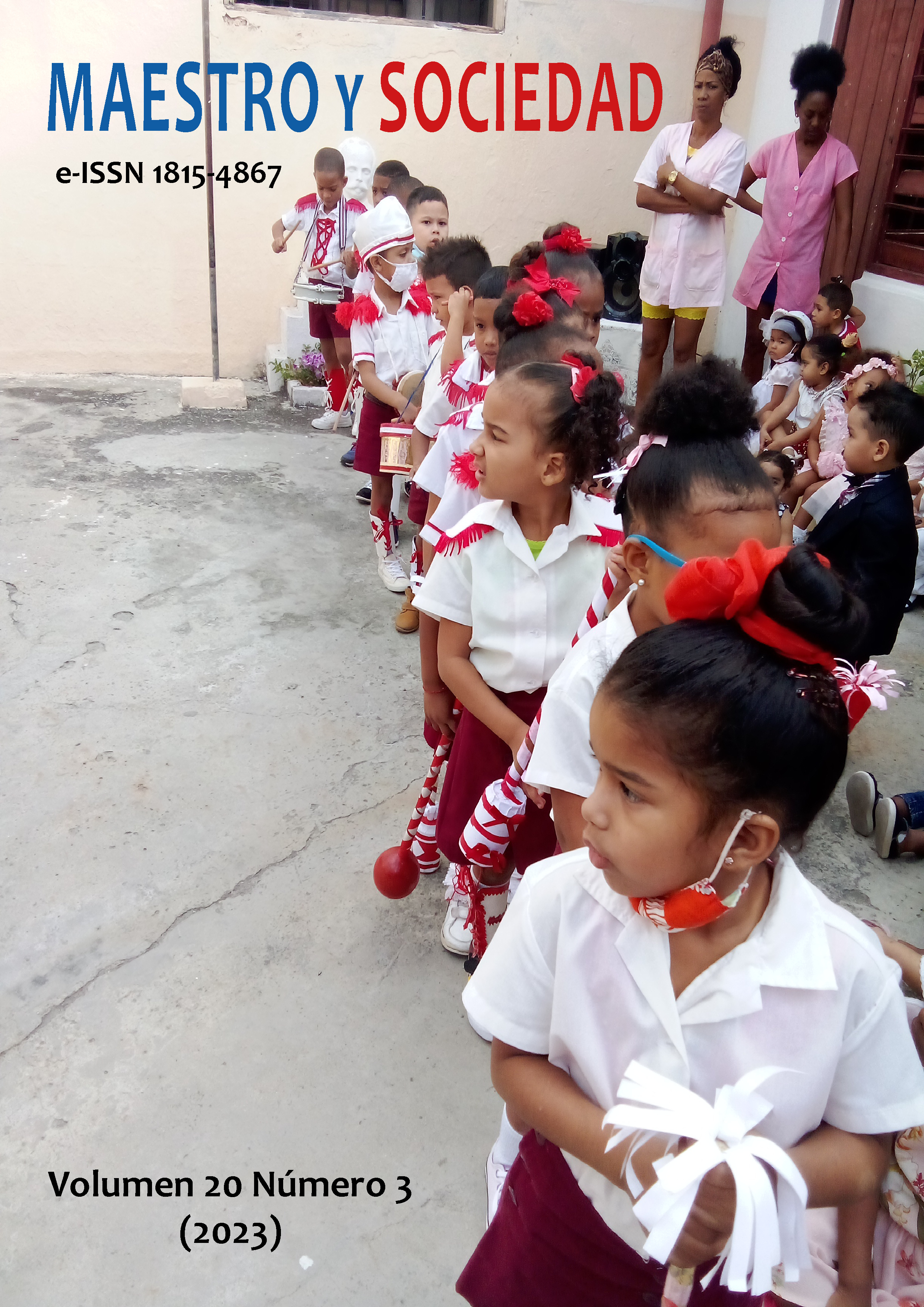Problem based learning to improve the teaching-learning process of Accounting in high school in Ecuador
Problem based learning to improve the teaching-learning process of Accounting in high school in Ecuador
Keywords:
Classroom, teacher, student, educational processAbstract
Introduction: The present investigative work arises from the difficulty that students present in terms of learning the Accounting subject. With the application of applied methods, what is sought is to analyze the didactic strategy of Problem-Based Learning for the improvement of the teaching-learning process in high school students of educational units in Ecuador. Materials and methods: The methodology applied within the present investigation maintains a mixed approach, that is, a qualitative and quantitative research approach was used, since through its use, the problem could be analyzed from its origin, analyzing its intrinsic characteristics, as well as interpreting the results obtained from the collection of information that will serve for the application of an innovative teaching-learning proposal for the benefit of the students, the research is documentary, bibliographical with a field investigation, through direct observation and survey application. Results: From the results obtained, it was evidenced that the application of Problem-Based Learning in the Accounting subject will favor the process of acquiring new knowledge, innovating and managing to arouse interest in learning and thus avoid repeating or dropping out of school. , which is why a teacher training plan on the application of Problem-Based Learning is proposed as an innovative tool in the teaching of Accounting, whose direct beneficiaries are the students. Discussion: The theoretical foundation of Problem-Based Learning was compiled through the extraction of bibliographic information, data classification, prioritization and validation of topics, research papers on this methodology and bibliographic experiences on suggested models applied in the teaching process. learning the subject of Accounting and other disciplines. Conclusions: The evaluation of the training plan allowed to determine its applicability, functionality and allowed to know the level of impact and the pleasure with which the proposal was received by the teachers of the Educational Units.
References
Alonso, A. (2018). La metodología ABP y su aplicación a las Ciencias Sociales. Viaje a la Prehistoria: una propuesta didáctica para 1o ESO [Universidad de Cantabria]. https://repositorio.unican.es/xmlui/bitstream/handle/10902/14465/AlonsoSanchez Amaia.pdf?sequence=1&isAllowed=y
Anaya, A. & Anaya, C. (2021). ¿Motivar para aprobar o para aprender? Estrategias de motivación del aprendizaje para los estudiantes. Tecnología, Ciencia, Educación, 25(1), 5–14. https://www.redalyc.org/pdf/482/48215094002.pdf
Andina, D., Rubio, I., & Lozano, J. (2018). Marco de análisis de los intereses y voz de las asociaciones de estudiantes. CUIEET, 24. https://digibuo.uniovi.es/dspace/bitstream/handle/10651/48555/CUIEETMartin.pdf?sequence=1
Arias, W., & Oblitas, A. (2014). Aprendizaje por descubrimiento vs. Aprendizaje significativo: Un experimento en el curso de historia de la psicología Learning by discovering vs meaningful learning: An experiment in the subject of history of psychology. Boletim Academia Paulista de Psicologia, 34(87), 455–471. https://bit.ly/2YR6SW6
Balsalobre, L. (2018). Aprendizaje basado en proyectos en educación secundaria: el orientador como agente de cambio. REOP, 29(3), 45–60. https://redined.educacion.gob.es/xmlui/bitstream/handle/11162/191962/Balsalobre. pdf?sequence=1&isAllowed=y
Bravo Salina, N. (1997). Pedagogía problémica, acerca de los nuevos paradigmas en educación. Editorial TM Convenio Andrés Bello.
Cañas, J. (2022). Aprendizaje Basado en Proyectos. Adaptación para el área de Matemáticas mediante educación on line. Campus Educación. Revista Digital Docente. https://www.campuseducacion.com/blog/revista-digital-docente/aprendizaje-basado-en-proyectos/
González, P., & Hernández, D. (2019). Capacitación profesoral y didáctica universitaria. INNOVA Research Journal, 1(11), 30–41. http://201.159.222.115/index.php/innova/article/view/60/101
Gutiérrez, M. (2018). Estilos de aprendizaje, estrategias para enseñar, su relación con el desarrollo emocional y “aprender a aprender.” Tendencias Pedagógicas, 31, 83–96. https://repositorio.uam.es/bitstream/handle/10486/680833/TP_31_7.pdf
Lamer, J. (2017). Ocho elementos esenciales para el ABP. https://formacion.intef.es/pluginfile.php/213112/mod_imscp/content/2/8_elemento s_esenciales_para_abp.html
Majmutov, M. I. (1983). La enseñanza problémica. Editorial del Pueblo y Educación.
Maldonado, M. (2019). APRENDIZAJE BASADO EN PROYECTOS
Morales, P., & Landa, V. (2004). Aprendizaje basado en problemas. Theoria, 13, 145–157. https://campus.usal.es/~ofeees/NUEVAS_METODOLOGIAS/ABP/13.pdf
Navarro, D., & Samón, M. (2017). Redefinición de los conceptos método de enseñanza y método de aprendizaje. EduSol, 17(60), 26–33. https://www.redalyc.org/journal/4757/475753184013/html/
Orts, J., & Vaello, O. (2012). Competencias socioemocionales del profesorado. Participación Educativa. Revista del Consejo Escolar del Estado, 5(8), 95–103. https://redined.educacion.gob.es/xmlui/bitstream/handle/11162/178710/Vaello_Competencias_socioemocionales.pdf?sequence=1&isAllowed=y
Palmero, S. (2020). La enseñanza del componente gramatocal: El método deductivo e inductivo. Universidad de La Laguna. https://riull.ull.es/xmlui/bitstream/handle/915/23240/La ensenanza del componente gramatical el metodo deductivo e inductivo.pdf?sequence=1&isAllowed=y
Paredes, C. (2016). Aprendizaje basado en problemas (ABP): Una estrategia de enseñanza de la educación ambiental, en estudiantes de un liceo municipal de Cañete. Revista ElectrÓnica EDUCARE, 20(1), 119–144. https://www.redalyc.org/journal/1941/194143011006/html/
Valenzuela, M., Pérez, V., Bustos, C., & Salcedo, P. (2017). Cambios en el concepto aprendizaje de estudiantes de pedagogía: análisis de disponibilidad léxica y grafos. Estudios Filosóficos, 143–173. http://146.83.217.169/index.php/efilolo/article/view/3377/2663
Downloads
Published
How to Cite
Issue
Section
License
Copyright (c) 2023 María Isabel Zedeño Chalares, Glenda María Gaibor Indio, María Belén Nieves Cobeña, Olga Nohemí Martínez Cobeña

This work is licensed under a Creative Commons Attribution-NonCommercial-NoDerivatives 4.0 International License.
This journal provides immediate open access to its content, based on the principle that offering the public free access to research helps a greater global exchange of knowledge. Each author is responsible for the content of each of their articles.



























 Universidad de Oriente
Universidad de Oriente 